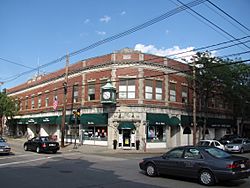Nonantum, Massachusetts facts for kids
Quick facts for kids
Nonantum, Massachusetts
|
|
|---|---|
|
Village
|
|

The Columbus Building, at the northeastern corner of Watertown and Adams Streets
|
|
| Country | United States |
| State | Massachusetts |
| County | Middlesex |
| City | Newton |
| Time zone | UTC-5 (Eastern (EST)) |
| • Summer (DST) | UTC-4 (EDT) |
Nonantum (pronounced Non-AN-tum) is a village in the city of Newton, Massachusetts. It's also known as Silver Lake or The Lake. This area is located along the Charles River. The name "Nonantum" comes from the Massachusett language, meaning "I bless it." Nonantum is a lively center for Italian people in Newton. You can find many great Italian restaurants and food shops here.
Contents
Nonantum's Past
In 1637, the Massachusetts Bay Colony named an area "Nonantum." This was a village set aside for Native Americans who had learned about Christianity. A missionary named John Eliot worked with Waban, a Native American leader, in this area.
How Nonantum Got Its Name
The neighborhood we know today as Nonantum was first called the North Village. It got its current name in the 1880s. This happened when the Nonantum Worsted Company bought the Dalby Mills there. This company became the biggest employer in the area. European settlers took over this land. They made Waban and his people move to Natick. Then, they divided the land into small farms. The Native Americans originally called the region Cohannet. But the settlers renamed it Nonantum. It was the first village for "praying Indians" gathered by Eliot. This is why it was given the name "I bless it."
From Farms to Factories
Starting in 1778, a paper mill was built on the Charles River. This marked a big change for Nonantum. Factories and industries began to replace farming. The village became a place where cotton, wool, and rope were made. This industrial work brought many new people to Nonantum. Immigrants from Ireland, France, Italy, and Jewish communities moved to the village for jobs.
The Story of Silver Lake
Silver Lake was once a popular spot for kids in Nonantum. They would clear the snow in winter to play hockey on it. This fun tradition continued through the 1950s. However, the lake was filled with construction waste. This process started in the 1930s and finished in 1971. Today, the lake is no longer there.
Lake Talk: A Secret Language
Lake Talk is a special way of speaking. It's used mostly by older Italian-American residents in Nonantum. No one is completely sure how Lake Talk started. A newspaper article in 2001 suggested it might be a mix of Italian and old World War II codes. Others think it sounds like Angloromani or Italian Romany slang.
Where Lake Talk Came From
In the late 1800s and early 1900s, the first Italian immigrants came to Nonantum. Many of them were from Castelvenere, a town in Italy. Later, many people from San Donato Val di Comino in Italy also settled in the village. Many people in Nonantum today are descendants of these early Italian families.
Common Lake Talk Words
Here are some examples of words and phrases used in Lake Talk:
- mush (rhymes with push) -- means "guy" or "man." It can be good or bad depending on how you say it.
- wicked pissa, mush! -- means "extremely awesome, man!"
- chabby -- means "boy child." It might be related to the Romany word chavvie for "boy."
- chor'd -- means "stolen." This might come from the Romany word choro for "thief."
- chuccuo (chu-co or chew-ch) -- means "donkey."
- cuya moi -- means "shut up" or "go away."
- divia (div-ya) -- means "crazy" or "a harmless screwball." You can use it as a noun or an adjective. For example, "The mush is a real divya" or "This mush is divya."
- inga -- means "unattractive" or "bad-tempered person" or "junk."
- jival -- means "chick" or "woman." It's the female version of mush.
- mush has a cormunga in his cover -- means "the guy is hiding a gun."
- mush is the earie -- means "the guy is listening."
- over-chay or overchay (ova-chay) -- means "it's a lie" or "he's an actor." It can also mean exaggeration.
- oy -- means "eat."
- pissa -- means "awesome."
- pukka to the mush -- means "tell the guy."
- quister jival (quest-ah jival) -- means "pretty woman."
- quister (quish-ta) -- means "awesome," "good," or "beautiful."
- quister mush (quest-ah mush) -- means "good, standup guy."
- shapdude (shup-dude) -- means "how's it going?"
- wonga -- means "money." For example, "That mush has a lotta' wonga."
- geech -- means "go away."
- gash -- means "feminine man."
- jawl -- means "steal" or "look at."
- dikki ki dotti -- means "unreal" or "unbelievable."
- minje -- means "dirty or unattractive woman."
- chooch -- means "friend" or "buddy."
- 24-911 -- means "Meet me in the Store 24 parking lot immediately."
Joe DeNucci, who grew up in Nonantum and became a politician, once said: "You talk the Lake language and only people from there can understand you. An awful lot of what it means is how you say it and how you use it. You improvise a lot, mixing it with carnival talk and bebop." Lake Talk is not just used in the neighborhood. Students from Nonantum have even spread it to Newton North High School.
Famous People from Nonantum
- Marianne Leone Cooper, an actress
- A. Joseph DeNucci, a politician and former professional boxer
- Matt LeBlanc, an actor
 | Madam C. J. Walker |
 | Janet Emerson Bashen |
 | Annie Turnbo Malone |
 | Maggie L. Walker |



